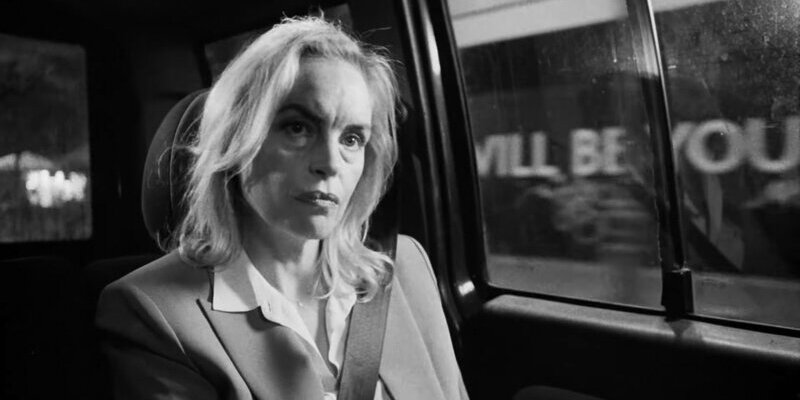
Review by
Eric Hillis
Directed by: Radu Jude
Starring: Ilinca Manolache, Nina Hoss, Uwe Boll, Dorina Lazar, Katia Pascariu, Sofia Nicolaescu

In recent years we've seen the emergence of a new sub-genre in European
cinema: movies that revolve around stressed out female protagonists
attempting to do their jobs, often in Eastern Europe, and often at the
behest of unscrupulous and exploitative employers. Examples include
Maren Ade's
Toni Erdmann, Eric Gravel's
Full Time, Ilker Catak's
The Teachers' Lounge, Sudabeh Mortezai's
Europa
and Ben Hecking's
Haar. Like Hecking's film, Radu Jude's
Do Not Expect Too Much from the End of the World is
centred on a day in the overworked life of a film production assistant
in an Eastern European capital that has opened its doors/legs to western
intervention/exploitation.
Ilinca Manolache gives a powerhouse performance as Angela, a PA
accustomed to working 16 hour days dashing from one corner of Bucharest
to another. To keep from falling asleep at the wheel, she chews gum,
knocks back cans of Red Bull and blares thumping "Turbo Folk" music
while driving. References to the death of Queen Elizabeth II place the
film as playing out over the course of September 8th, 2022. On this day
Angela is tasked with visiting the homes of former employees of a
Bucharest-based Austrian furniture manufacturer whose employment was
ended by workplace injuries. The Austrian company wishes to produce a
safety at work promo video, and so it's up to Angela to film auditions
among their now disabled former workers, who are encouraged to stress
that no blame for their mishaps lies with the company.

While performing her work duties, Angela also attends to personal
matters, involving her family's burial plot, which is about to be moved
to make way for condos, and a quickie with an older lover in an
arrangement that seems closer to sex work than a romantic relationship.
Angela also finds time to record a series of offensive TikTok videos in
which she employs a crude face filter to transform her self into her
online alter-ego – "Bobita", a foul-mouthed parody of the sort of male
chauvinist windbags who scream abuse at her from passing cars. At one
point she even runs into the infamous German filmmaker
Uwe Boll in a scene that plays like a twisted version of that
episode of The Cosby Show where the Huxtables meet Stevie
Wonder.
Angela's day is intercut with footage from
Angela merge mai departe, a 1981 Romanian film about a female taxi driver, also called Angela.
The actress who played Angela in that film, Dorina Lazar, also
appears as a present day version of the same character, now the mother
of one of the injured parties Manolache's Angela is auditioning.

The contrast between the stressful hand-to-mouth existence of
Manolache's Angela and the chilled out cabbie we see in the 1981 footage
serves as a damning indictment of modern day capitalism. We hear younger
generations who were barely alive during the communist years talk about
what an awful time it was, but the older people seem nostalgic for a
time that provided a reassuring certainty, and they express sympathy
with the young people forced to work multiple jobs and long hours today.
You won't have to be a resident of a former communist nation to
recognise this dynamic, as young people in prosperous western nations
similarly lack the basic stability taken for granted by previous
generations.
A punk rock movie with a prog rock running time, Jude's film is
simultaneously an exhilarating and exhausting experience. By the two
hour mark we feel like we've spent an entire day shadowing Angela, and
the film is so densely packed with entertaining incidents, encounters,
anecdotes, jokes and aphorisms that it's difficult to recall them all.
Highlights include a hilarious broken English zoom meeting between
Angela's Romanian colleagues and the Austrian firm's head of marketing
(Nina Hoss with a chilling depiction of the sort of "liberal on
the outside, fascist on the inside" types who increasingly run today's
corporate world); a not-so funny and seemingly endless montage of
crosses erected to commemorate those who perished on Romania's
notoriously hazardous roads; and a final hour-long static shot of the
inept process of trying to film the aforementioned safety video.

With jokes made at the expense of everyone from the heads of
multi-national companies to crippled gypsies, it's hard to tell if Jude
is punching up, down or sideways with his satire, but nobody is left
without a few bruises by the end of it all. You might need a few cans of
Red Bull to get through the experience, but you'll come away from Jude's
film with one hell of a sugar rush. This is cinematic cocaine.


